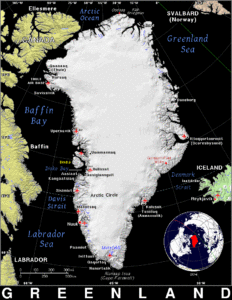 Greenland has been in the news a lot lately. The world’s largest island – and least densely populated region on earth – is home to under 60,000 people. Ice covers 75 percent of its surface. Normally this lonely place nestled between the Arctic and Atlantic Oceans would garner scant attention.
Greenland has been in the news a lot lately. The world’s largest island – and least densely populated region on earth – is home to under 60,000 people. Ice covers 75 percent of its surface. Normally this lonely place nestled between the Arctic and Atlantic Oceans would garner scant attention.
But thanks to U.S. President Donald Trump’s pronouncement of his intention to “buy Greenland“, everyone from the Danish government, to Greenland’s prime minister, to the breathless U.S. political commentariat, to even the European Union, are suddenly interested in the fate of the immense Arctic island that is an autonomous territory of Denmark.
Trump’s comments – and the seriousness of his intent – have sparked panic in Copenhagen.
The Danish government has announced a DKK14 billion ($2 billion) defense package aimed at bolstering the country’s military and security capabilities in the Arctic and North Atlantic region, which covers Greenland. That spending had been in the works for a while, but the announcement was made earlier than expected to counter Trump’s public statements.
For a country with an annual defense budget hovering between $4-5 billion the uptick in spending is no small outlay. However, the additional monies will do little to allay Danish fears of U.S. intentions – or much to alter the security response and defense capabilities of the vast island.
In addition to this, Denmark’s Prime Minister Mette Frederiksen has undertaken a diplomatic tour of European capitals to try and drum up support for Copenhagen’s position.
The core issue – aside from the obvious and very real worries about upsetting geopolitical norms – is that Denmark is a NATO Alliance member and longstanding U.S. ally. Moreover, Denmark is one of the most closely aligned and reliable European NATO partners to the U.S. and willingly deployed soldiers to fight alongside Americans in missions in Afghanistan and Iraq.
Trump’s rather indelicate approach in the handling of a nation favorable to Washington therefore becomes natural ground for criticism.
Nonetheless, the question of whether the U.S. should consider purchasing Greenland bears consideration.
The idea of the U.S. purchasing Greenland is not new – before Trump floated it in his first presidential term, Harry Truman made overtures to Denmark in 1946 – but as with all things involving the current president, sifting through rhetoric to grasp the logic becomes a hurdle unto itself.
Certainly, a degree of astonishment and outcry is warranted considering Trump’s other comments about annexing Canada, threatening to reimpose U.S. control over the Panama Canal, and, in his latest move, sidestepping European allies and Kiev itself to negotiate a peace plan directly with Russia to end the Ukraine war.
But once the political angle from everyone’s personal lens is removed, is there actually any real logic to Trump’s intention – or is the underlying issue less about national security considerations and more about respect for international norms and recognition of national sovereignty?
While Greenland is de jure Danish territory, the island is semi-autonomous, economically dependent upon its fishing industry and subsidies from Denmark, and geographically lies closer to the U.S. than Copenhagen.
Further, it sits in the strategic GIUK (Greenland-Iceland-United Kingdom) gap, a critical maritime chokepoint that is crucial for power projection in the North Atlantic. Greenland’s location, in effect, serves as a bridge between Europe, North America, and the Arctic.
Finally, it is home to the largest reserves of rare earth minerals, crucial elements used in technology applications ranging from consumer electronics to military hardware to wind turbines and solar panels. With China standing as far-and-away the dominant market share holder in the rare earth mineral supply chain, policymakers in Washington – asleep at the wheel for far too long as America’s crucial mineral chain was effectively shut down and exported – have finally woken up to how overly exposed the U.S. economy and military are to Chinese control over the market.
In short, this seemingly (to outsiders) icy wasteland is, in fact, strategically vital. Even more so at a time the Arctic is warming, thereby enabling commercial shipping – and military transport – to maneuver through formerly forbidding waters.
This gradual change has prompted Russia to reopen ex-Soviet military bases and enlarge its footprint in the area. China, too, has declared itself a “near-Arctic state” as it seeks to expand economic ties to the region and deepens military cooperation with Russia along the rim of Alaska.
The warming of the Arctic Ocean region not only presents opportunity for easier transshipment, but also easier access to untapped natural resources.
Thus, the idea of a deepening China-Russia partnership along the northern approaches to North America, coupled with Chinese economic interests in Greenland’s mineral resources, naturally provokes concern in Washington.
Furthermore, no matter how warmly policymakers in D.C. feel about Denmark, there is little faith that Copenhagen will be able to invest in, and uphold, Greenland’s territorial security without significant U.S. support. The Danish government would be the first to admit that – and has already offered to Washington the opportunity to help enhance security around Greenland.
In fact, the vehicle for such security cooperation already exists in the 1951 Defense of Greenland Agreement. This provides the U.S. with extensive rights of military basing and access on the island. An update to that agreement was agreed to in 2004, which enables the longstanding arrangement to be amended at any time.
While it will not provide the U.S. with unfettered access to Greenland’s rare earth mineral deposits, the agreement at least would serve as a starting point for any strengthening of U.S. and NATO military presence on the island. Trump should drop the zero-sum demands used as an opening gambit and deliberate with the governments of Denmark and Greenland on what a satisfactory U.S. military posture on the island would look like.
Rare earth mining rights can always be negotiated later. And in the interim, a close ally can finally exhale.
Dan Darling is Forecast International’s director of military and defense markets. In this role, Dan oversees a team of analysts tasked with covering everything from budgeting to weapons systems to defense electronics and military aerospace. Additionally, for over 17 years Dan has, at various times, authored the International Military Markets reports for Europe, Eurasia, the Middle East and the Asia-Pacific region.
Dan's work has been cited in Defense News, Real Clear Defense, Asian Military Review, Al Jazeera, and Financial Express, among others, and he has also contributed commentary to The Diplomat, The National Interest and World Politics Review. He has been quoted in Arabian Business, the Financial Times, Flight International, The New York Times, Bloomberg and National Defense Magazine.
In addition, Dan has made guest appearances on the online radio show Midrats and on The Media Line, as well as The Red Line Podcast, plus media appearances on France 24 and World Is One News (WION).
image sources
- Greenland From the Air: Stig Nygaard @Flickr




